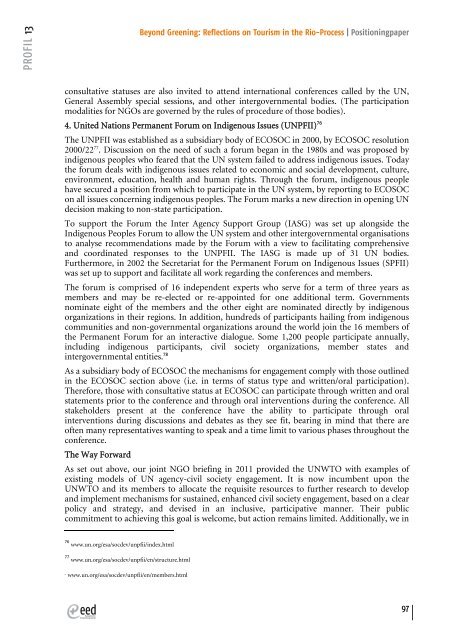Beyond Greening - Tourism Watch
Beyond Greening - Tourism Watch
Beyond Greening - Tourism Watch
Create successful ePaper yourself
Turn your PDF publications into a flip-book with our unique Google optimized e-Paper software.
<strong>Beyond</strong> <strong>Greening</strong>: Reflections on <strong>Tourism</strong> in the Rio-Process | Positioningpaperconsultative statuses are also invited to attend international conferences called by the UN,General Assembly special sessions, and other intergovernmental bodies. (The participationmodalities for NGOs are governed by the rules of procedure of those bodies).4. United Nations Permanent Forum on Indigenous Issues (UNPFII) 76The UNPFII was established as a subsidiary body of ECOSOC in 2000, by ECOSOC resolution2000/22 77 . Discussion on the need of such a forum began in the 1980s and was proposed byindigenous peoples who feared that the UN system failed to address indigenous issues. Todaythe forum deals with indigenous issues related to economic and social development, culture,environment, education, health and human rights. Through the forum, indigenous peoplehave secured a position from which to participate in the UN system, by reporting to ECOSOCon all issues concerning indigenous peoples. The Forum marks a new direction in opening UNdecision making to non-state participation.To support the Forum the Inter Agency Support Group (IASG) was set up alongside theIndigenous Peoples Forum to allow the UN system and other intergovernmental organisationsto analyse recommendations made by the Forum with a view to facilitating comprehensiveand coordinated responses to the UNPFII. The IASG is made up of 31 UN bodies.Furthermore, in 2002 the Secretariat for the Permanent Forum on Indigenous Issues (SPFII)was set up to support and facilitate all work regarding the conferences and members.The forum is comprised of 16 independent experts who serve for a term of three years asmembers and may be re-elected or re-appointed for one additional term. Governmentsnominate eight of the members and the other eight are nominated directly by indigenousorganizations in their regions. In addition, hundreds of participants hailing from indigenouscommunities and non-governmental organizations around the world join the 16 members ofthe Permanent Forum for an interactive dialogue. Some 1,200 people participate annually,including indigenous participants, civil society organizations, member states andintergovernmental entities. 78As a subsidiary body of ECOSOC the mechanisms for engagement comply with those outlinedin the ECOSOC section above (i.e. in terms of status type and written/oral participation).Therefore, those with consultative status at ECOSOC can participate through written and oralstatements prior to the conference and through oral interventions during the conference. Allstakeholders present at the conference have the ability to participate through oralinterventions during discussions and debates as they see fit, bearing in mind that there areoften many representatives wanting to speak and a time limit to various phases throughout theconference.The Way ForwardAs set out above, our joint NGO briefing in 2011 provided the UNWTO with examples ofexisting models of UN agency-civil society engagement. It is now incumbent upon theUNWTO and its members to allocate the requisite resources to further research to developand implement mechanisms for sustained, enhanced civil society engagement, based on a clearpolicy and strategy, and devised in an inclusive, participative manner. Their publiccommitment to achieving this goal is welcome, but action remains limited. Additionally, we in76 www.un.org/esa/socdev/unpfii/index.html77 www.un.org/esa/socdev/unpfii/en/structure.html78www.un.org/esa/socdev/unpfii/en/members.html97












